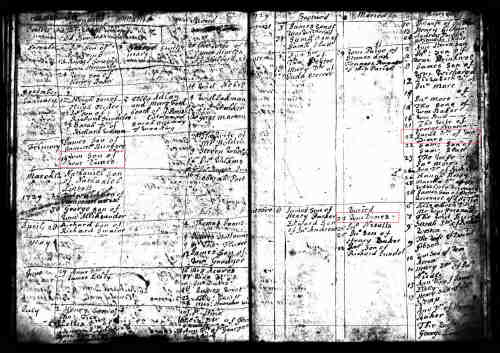William Dimes
- Christened: 17 Feb 1729, Guildford, Surrey, England
- Marriage (1): Elizabeth Franks on 6 Sep 1757 in Battersea, London, England
- Died: 1 Apr 1814 at age 85

 General Notes: General Notes:
1743 apprenticed to John Leech, coachmaker and Freeman of London for £42. Between 1756 and 1776, William had 6 apprentices of his own. In 1763 Thomas Mortimer's directory lists him as a coachmaker. Early in 1778 he insured his premises in Dartmouth Street, Westminster with Sun Fire Insurance Company. His brick house and household goods were valued at £3000, his brick workshops, utensils, stock and goods in trust were valued at £4000, his plate was insured for £50 and his wearing apparel for £50. He was declared bankrupt on 25 July 1778 and in September that year his premises were re-insured by Samuel Hobson, carver of Langley St & Robert Bromfield, coach joiner, the assignees to William's estate. By October, William was living in Anderson Walk, Lambeth. The following year, as executor of the will of Caleb Carrington, William was insuring his house in Britannia St, Lambeth. By 1788 William was living in Vauxhall and when he died on 1 April 1814 he was described as 'late of Amersham'.
Will- Proved on 3 August 1814. He bequeathed leasehold property in Princes Row, Lambeth, worth £300 to his brother Charles and divided £1,200 worth of stocks among his family.
The following in an extract from www.oldbaileyonline.org concerned a theft of a spoon from William's kitchen.
Samuel Hardy, theft : simple grand larceny, 10th April, 1771.
The Proceedings of the Old Bailey Ref: t17710410-32
<http://www.oldbaileyonline.org/facsimiles/1770s/177104100031.html>
See original <http://www.oldbaileyonline.org/facsimiles/1770s/177104100031.html>
Trial Summary:
Crime(s): theft : simple grand larceny
Punishment Type: transportation
(Punishment details may be provided at the end of the trial.)
Verdict: Guilty
Original Text:
271. (Ist. M.) Samuel Hardy was indicted for stealing one large table spoon, value 5 s. the property of William Dimes , Feb. 22. *
William Dimes . I live in Long-acre; I am a coach-maker. On the twenty-second of February, a woman told me the dust people had been there to take away the dust, and the maid had missed a silver spoon out of the fore kitchen. I went to the fore shop, and there the maid was accusing the prisoner of having taken the spoon.
Q. What is her name?
Dimes. Ann Frogley . The prisoner and the woman were protesting their innocency: I saw two other dust men in the shop; I asked them if they knew any thing of a spoon; they said if there had been any thing taken out of the kitchen, it must be by that man. While I was talking to them, a woman that was supposed to be concerned, called one of my apprentices away to a passage, and shewed him the spoon behind a door; so I took the prisoner and the woman before Justice Sherwood. The prisoner confessed to his taking the spoon, and hiding it in that place; he said that he took the spoon out of the kitchen, and hid it behind the door; and said it was because he was in liquor.
Q. When your apprentice found the spoon in the passage, what became of it?
Dimes. He took it to the justice: I cannot swear to it; my wife can.
Q. Is that the spoon that was behind the door?
Dimes. I make no doubt of it; I cannot swear to it.
Elizabeth Dimes . I can swear to that spoon; it is my husband's property.
Q. Do you remember the time it was lost?
Dimes. Yes; the twenty-second of February: it was on the dresser.
Q. Was you there when the spoon was found?
Dimes. Yes.
Q. Is that the same?
Dimes. Yes, that is the same spoon: it has been in their possession.
Q. You was not at the justices to hear what they said?
Dimes. No.
Ann Frogley . That is my master's spoon.
Q. Did you see the prisoner in the kitchen?
Frogley. He went down to light a candle; I saw him coming up. I was in the kitchen about a quarter of an hour before that; I saw the spoon then: I left it on the dresser; and, as soon as I went, I missed it. I went to my master, and said I missed the spoon, and then went and took hold of the prisoner. He said, before the justice, that he was in the kitchen, and took the spoon.
John Field . I came out of the shop when she was taxing the man; the woman took me into the passage, and I saw the spoon behind the door?
Q. Did that passage lead down to the kitchen?
Field. This is a passage two or three doors off; it is a passage next door but one to the house, in another house.
Q. But the prisoner was not out of the house when you seized him; was he?
Field. The spoon was found in the house of one Tiggin, a baker.
Q. Did any of your people see the prisoner go into that house?
Field. No; it was a woman that follows the cart?
Q. Was you before the justice?
Field. Yes.
Q. Did you hear the prisoner say any thing?
Field. Yes; he said he took the spoon out of the kitchen.
Prisoner's Defence.
Not guilty, my lord; indeed, Sir, I did not steal the spoon.
Guilty , T .

William married Elizabeth Franks, daughter of Unknown Franks and Ann Walmesley, on 6 Sep 1757 in Battersea, London, England.
 Marriage Notes: Marriage Notes:
William was of St. Margaret, Westminster.
|



 General Notes:
General Notes: